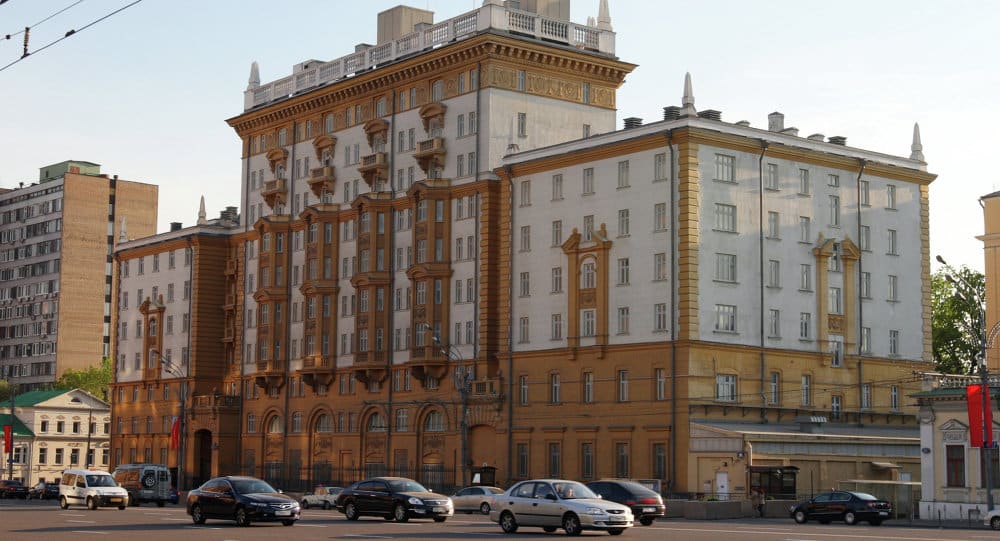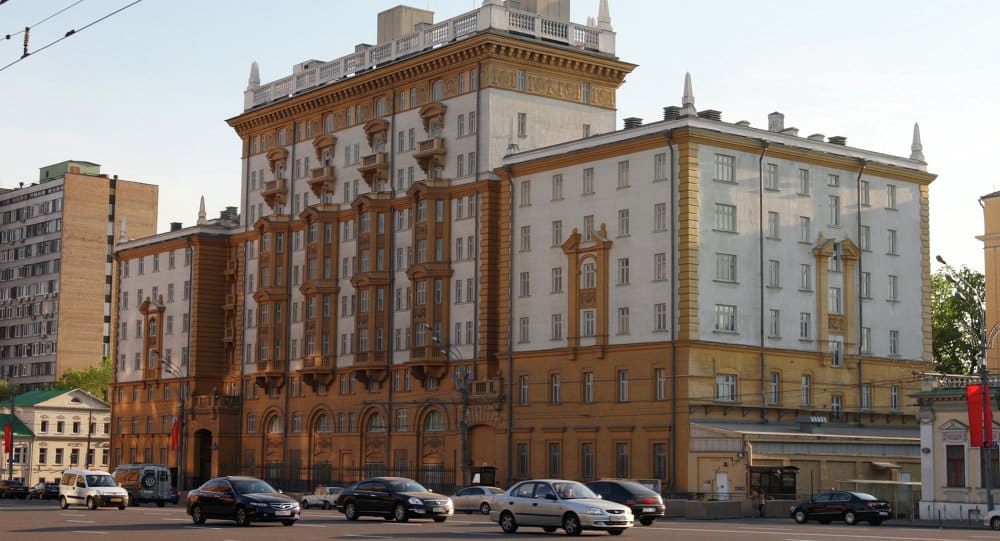Last autumn, as the Obama administration considered mass expulsions of Russian diplomats from the US in response to the burgeoning Russiagate scandal, John Tefft – the US ambassador to Russia – is reported to have warned against taking this step. Tefft’s reasons for opposing it were that the likely strong response from the Russians, which would lead to expulsions of US diplomats from Russia, would threaten the effective work of the US embassy in Moscow and of the US consulates in Russia.
The Obama administration in the end failed to heed Tefft’s warning. Though in the event the Russians in December stayed their hand as they waited to see what the new Trump administration would bring, now that the US Congress has voted to increase the sanctions on Russia and with the return of seized Russian diplomatic properties in the US ruled out, the Russians have finally responded. Their response must however go beyond Tefft’s worst fears
The Russians order to the US to reduce the staff at their embassy and consulates in Russia by 755 persons is in fact unprecedented. As the BBC rightly says, though a large part of the reduction will no doubt be accounted for by non-diplomatic staff, the Russian announcement still constitutes what is by far the single biggest expulsion of diplomats in modern history
The decision to expel staff was made on Friday, but Mr Putin has now confirmed the number who must go by 1 September.
It brings staff levels to 455, the same as Russia’s complement in Washington.
This is thought to be the largest expulsion of diplomats from any country in modern history, says the BBC’s Laura Bicker in Washington.
The number includes Russian employees of the US diplomatic missions across Russia, the BBC’s Sarah Rainsford in Moscow adds.
Staff in the embassy in Moscow as well as the consulates in Ekaterinburg, Vladivostok and St Petersburg are affected, she says.
Moreover the Russian decision now establishes the principle that the number of personnel at US embassies and consulates in Russia will in future be held to the same level – currently 455 – as the number of personnel at Russian embassies and consulates in the US.
That means that any future expulsions of Russian diplomats in the US – or any US refusal of visas to Russian diplomats to fill vacant posts at the Russian embassies and consulates in the US, as has apparently been happening – will be matched exactly equal expulsions of US diplomats from Russia, and refusals of visas to US diplomats seeking to fill vacant posts in US embassies and consulates in Russia.
That this is a heavy blow to the US is highlighted by one interesting fact. It turns out that the number of personnel working at US embassies and consulates in Russia was almost three times greater than the number of personnel working at Russian embassies and consulates in the US.
That begs the question of what all these extra US personnel were doing there? Perhaps US embassies and consulates are less efficient than Russian ones. However I suspect that the Russians believe that many if not most of these extra people were actually engaged in intelligence gathering and “democracy promotion” activities. If so then these have now suffered a heavy blow as a result of the Russian action, which explains Tefft’s concern.
Regardless of the damage done to US diplomatic missions and intelligence and ‘democracy promotion’ operations in Russia, nothing better illustrates the introverted quality of foreign policy debate in the US than the response to the biggest expulsion of US diplomatic personnel from Russia since the two countries first established diplomatic relations in 1933. Though nothing comparable has happened since the Soviet government expelled US ambassador George Kennan from the USSR in September 1952 at the height of the Cold War, one would scarcely know the fact from the way the US media is reporting the story.
This fact illustrates a greater truth: for much of the US elite- including most of the US media – the new sanctions bill is not really aimed at damaging Russia but rather at damaging President Trump. To achieve that objective all other interests are being sacrificed.
Just as the fundamental economic interests of the US’s European allies are being sacrificed to what is ultimately an internecine factional quarrel within the US of which the Russiagate scandal is only the outward manifestation, so a crippling blow to the US diplomatic and intelligence operation in Russia is being barely noticed, as those sponsors of the new sanctions bill who are not driven by purely commercial interests (see here and here) focus almost exclusively on their feud with President Trump.
The result is that US foreign policy barely exists any more.
Reprinted with permission from The Duran.


